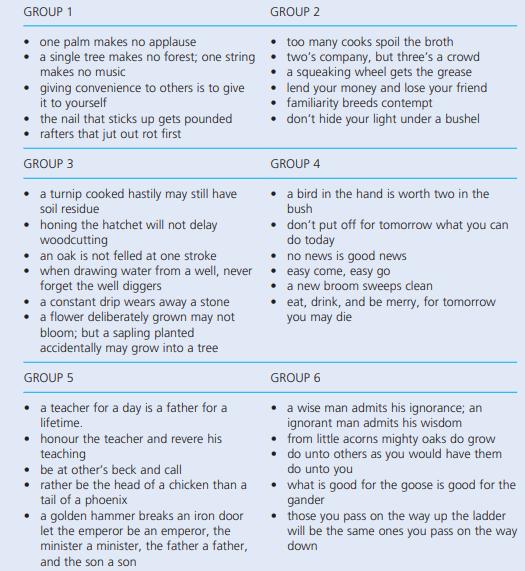Question:
1. Students form into small groups.
2. The table below shows three six proverb groups. Compare Group 1 and 2, and answer the following questions:
(a) Which of Hofstede’s orientations does each proverb group promote?
(b) Explain the message in the proverbs related to that dimension.
(c) What countries do you think these proverbs describe? What is your reasoning?

3. Repeat the process for Group 3 and 4; and then for Group 5 and 6.
4. Can you think of another proverb from your own country that seems to reflect an aspect of its national culture?
5. If you were to offer a foreign visitor to your own country one piece of cultural advice as to what to do or avoid doing when interacting with a resident (in their home, in an office, or on the street) what would that advice be?
Transcribed Image Text:
GROUP 1
• one palm makes no applause
• a single tree makes no forest; one string
makes no music
• giving convenience to others is to give
it to yourself
• the nail that sticks up gets pounded
• rafters that jut out rot first
GROUP 3
• a turnip cooked hastily may still have
soil residue
• honing the hatchet will not delay
woodcutting
• an oak is not felled at one stroke
when drawing water from a well, never
forget the well diggers
• a constant drip wears away a stone
• a flower deliberately grown may not
bloom; but a sapling planted
accidentally may grow into a tree
GROUP 5
• a teacher for a day is a father for a
lifetime.
• honour the teacher and revere his
teaching
be at other's beck and call
• rather be the head of a chicken than a
tail of a phoenix
• a golden hammer breaks an iron door
let the emperor be an emperor, the
minister a minister, the father a father,
and the son a son
GROUP 2
too many cooks spoil the broth
two's company, but three's a crowd
a squeaking wheel gets the grease
• lend your money and lose your friend
familiarity breeds contempt
• don't hide your light under a bushel
GROUP 4
• a bird in the hand is worth two in the
bush
• don't put off for tomorrow what you can
do today
no news is good news
•
• easy come, easy go
• a new broom sweeps clean
•
eat, drink, and be merry, for tomorrow
you may die
GROUP 6
• a wise man admits his ignorance; an
ignorant man admits his wisdom
•
from little acorns mighty oaks do grow
do unto others as you would have them
do unto you
• what is good for the goose is good for the
gander
• those you pass on the way up the ladder
will be the same ones you pass on the way
down







